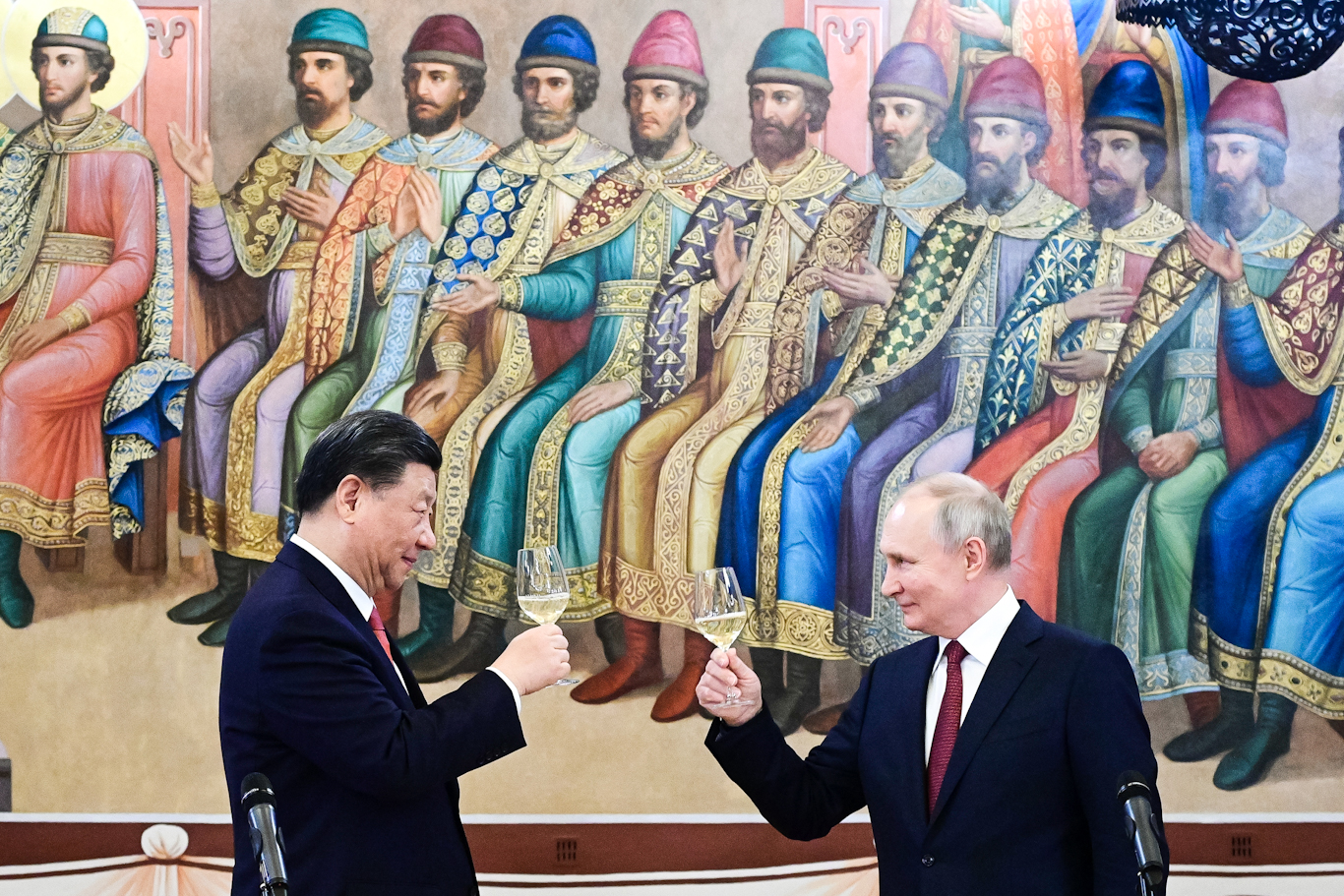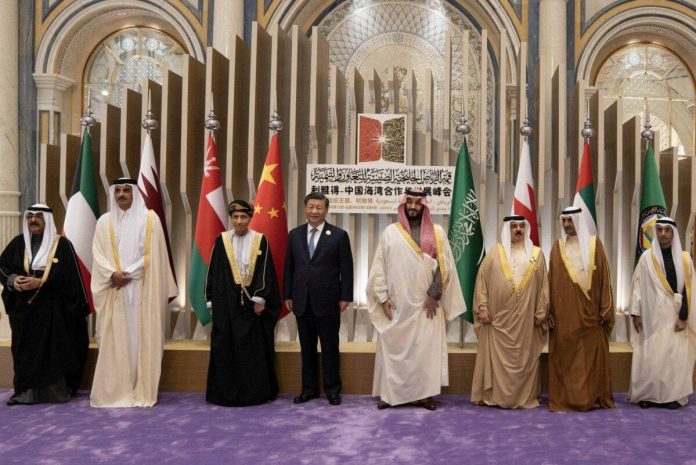The final exchange, caught on camera between visiting Chinese President Xi Jinping and his Russian host and counterpart, Vladimir Putin, sums up the current geopolitical conflict, still in its nascent stages, between the United States and its Western allies on the one hand, and Russia, China and their allies, on the other.
Xi was leaving the Kremlin following a three-day visit that can only be described as historic. “Change is coming that hasn’t happened in 100 years, and we are driving this change together,” Xi said while clasping Putin’s hand.
“I agree,” Putin replied while holding Xi’s arm. ‘Please take care, dear friend,” he added.
In no time, social media exploded by sharing that scene repeatedly. Corporate western media analysts went into overdrive, trying to understand what these few words meant.
“Is that part of the coming change that they will drive together?” Ian Williamson raised the question in the Spectator. Though he did not offer a straight answer, he alluded to one: “It is a chilling prospect for which the west needs to be prepared.”
Xi’s statement was, of course, uttered by design. It means that the strong Chinese-Russian ties, and possible future unity, are not an outcome of immediate geopolitical interests resulting from the Ukraine war or a response to US provocations in Taiwan. Even before the Ukraine war commenced in February 2022, much evidence pointed to the fact that Russia and China’s goal was hardly temporary or impulsive. Indeed, it runs deep.
The very language of multipolarity has defined both countries’ discourse for years, a discourse that was inspired mainly by the two countries’ displeasure with US militarism from the Middle East to Southeast Asia, their frustration with Washington’s bullying tactics whenever a disagreement arises, be it in trade or border demarcations; the punitive language; the constant threats; the military expansion of NATO and much more.
One month before the war, I argued with my co-writer, Romana Rubeo, that Russia and China might be at the cusp of unity. That conclusion was drawn based on a simple discourse analysis of the official language emanating from both capitals and the actual deepening of relations.
At the time, we wrote:
Some kind of an alliance is already forming between China and Russia. The fact that the Chinese people are taking note of this and are supporting their government’s drive towards greater integration – political, economic and geostrategic – between Beijing and Moscow indicates that the informal and potentially formal alliance is a long-term strategy for both nations.”

Even then, like other analysts, we did not expect such a possibility to be realized so quickly. The Ukraine war, in itself, was not indicative that Moscow and Beijing would grow closer. Instead, Washington’s response, threatening and humiliating China, did most of the work. The visit by then-US House Speaker Nancy Pelosi to Taiwan in August 2022 was a diplomatic disaster. It left Beijing with no alternative but to escalate and strengthen its ties with Russia, with the hope that the latter would fortify its naval presence in the Sea of Japan. In fact, this was the case.
But the “100 years” reference by Xi tells of a much bigger geopolitical story than any of us had expected. As Washington continues to pursue aggressive policies – with US President Joe Biden prioritizing Russia and his Republican foes prioritizing China as the main enemy of the US – the two Asian giants are now forced to merge into one unified political unit with a common political discourse.
“We signed a statement on deepening the strategic partnership and bilateral ties which are entering a new era,” Xi said in his final statement.
This ‘no-limits friendship’ is more possible now than ever, as neither country is constrained by ideological confines or competition. Moreover, they are both keen on ending the US global hegemony, not only in Asia and the Pacific but also in Africa, the Middle East and, eventually, worldwide.
On the first day of Xi’s visit to Moscow, Russia’s President Putin issued a decree in which he wrote off debts of African countries worth more than $20 billion. Moreover, he promised that Russia is “ready to supply the whole volume sent during the past time to African countries particularly requiring it, from Russia free of charge ..,” should Moscow decide “not to extend the (grain) deal in sixty days.”
Africa is a major ally in the upcoming global conflict for both countries. The Middle East, too, is vital. The latest agreement, which normalized ties between Iran and Saudi Arabia, is earth-shattering, not only because it ends seven years of animosity and conflict but because the arbitrator was no other than China itself. Beijing is now a peace broker in the very Middle East, which was dominated by failed US diplomacy for decades.
What this means for the Palestinians remains to be seen, as too many variables remain at work. But for these global shifts to serve Palestinian interests in any way, the current leadership, or a new leadership, would have to slowly break away from its reliance on western handouts and validation and, with the support of Arab and African allies, adopt a different political strategy.
However, the US government continues to read the situation entirely within the Russia-Ukraine war context. For example, US Secretary of State Antony Blinken responded to Xi’s trip to Moscow by saying that “the world should not be fooled by any tactical move by Russia, supported by China or any other country, to freeze the war (in Ukraine) on its own terms.” It is rather strange but also telling that Washington, not Kyiv, made the outright rejection of the potential call for a ceasefire.
Xi’s visit, however, is genuinely historical from a geopolitical sense. It is comparable in scope and possible consequences to former US President Richard Nixon’s visit to Beijing, which contributed to the deterioration of ties between the Soviet Union and China under Chairman Mao Zedong.
The improved relationship between China and the US back then helped Washington further extend its global dominance while putting the USSR on the defensive. The rest is history, one that was rife with geostrategic rivalry and divisions in Asia, thus, ultimately, the rise of the US as the uncontested power in that region.
Then-Ambassador Nicholas Platt described Nixon’s visit to Beijing as “the week that changed the world.” Judging that statement from an American-centric view of the world, Platt was, in fact, correct in his assessment. The world, however, seems to be changing back. Though it took 51 years for that reversal to take place, the consequences are likely to be earth-shattering, to say the least.
Regions that have long been dominated by the US and its western allies, like the Middle East and Africa, are processing these changes and potential opportunities. If this geopolitical shift continues, the world will, once again, find itself divided into camps. While it is too early to determine, with any degree of certainty, the winners and losers of this new configuration, it is almost certain that a US-western-dominated world is no longer possible.
Feature photo | Illustration by MintPress News
Dr. Ramzy Baroud is a journalist, author and the Editor of The Palestine Chronicle. He is the author of six books. His latest book, co-edited with Ilan Pappé, is ‘Our Vision for Liberation: Engaged Palestinian Leaders and Intellectuals Speak Out.’ His other books include ‘My Father was a Freedom Fighter’ and ‘The Last Earth’. Baroud is a Non-resident Senior Research Fellow at the Center for Islam and Global Affairs (CIGA). His website is www.ramzybaroud.net
The post Xi’s ‘Chilling’ Remarks: What the New Multipolar World Means for the Middle East and Africa appeared first on MintPress News.
